Outcry Against Iran’s Baha'i Suppression

ABout 150 political and civil activists in Iran have joined forces to condemn what they denounce as a "new wave of Baha'i suppression."

ABout 150 political and civil activists in Iran have joined forces to condemn what they denounce as a "new wave of Baha'i suppression."
Latest reports reveal the Islamic Republic's security forces seizing extensive land, totaling tens of hectares, from Baha'i citizens in the northern region, notably in Ahmadabad village near Sari. The lands have been in possession of the Baha'i community for over seven decades.
The land seizure unfolds as part of broader systematic efforts by the Iranian government to suppress the Baha'i religious minority, including property confiscations in Semnan and demolitions of Baha'i homes in Roshankooh village within the past year.
The joint statement strongly opposes the policies of the Islamic Republic and provides a concise history of political and social pressures on the Baha'i minority over the past century and a half. It declares that the "comprehensive deprivation of Baha'is from their civil rights under the ruling of religious despotism and theocratic system has reached its peak."
The statement details various oppressive actions against the Baha'i community, emphasizing the brutality faced, and condemns the recent surge in arrests targeting Baha'is. The activists denounce the "brutal and inhumane" behavior of the Islamic Republic toward the religious minority. They urge all social and political activists to voice support for Baha'i citizens and demand the cessation of the religious government, advocating for the establishment of a democratic and secular government.
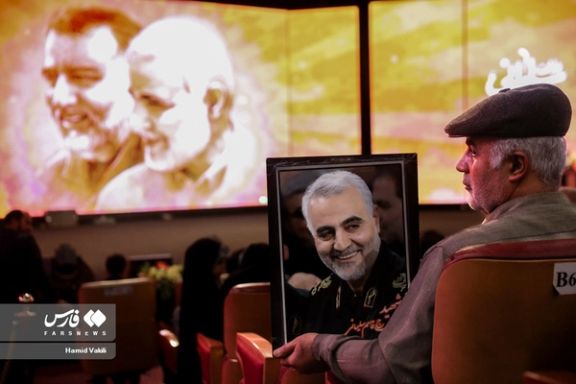
An Israeli drone killed top Hamas leader Saleh Al-Arouri Tuesday, on the eve of the fourth anniversary of the US killing of IRGC commander Qasem Soleimani.
Some hardline commentators in Iran are suggesting that the timing has been deliberate and all the more insulting. Al-Arouri was killed just as state-media in Iran broadcast images of mourners paying homage to Soleimani in his hometown of Kerman.
Iran’s permanent mission to the United Nations registered another protest on Tuesday, claiming a “legitimate right under international law to pursue legal proceedings to hold accountable and bring to justice perpetrators” of Soleimani’s killing.
Whether or not the timing was deliberate, it’s only natural that Soleimani’s name would be invoked in any such attack, since he played a crucial, perhaps unique, role in strengthening the multiplicity of armed groups which the Islamic Republic calls the Axis of Resistance –and many in the West call Iran proxies.
In more than two decades at the head of the IRGC’s Quds forces, Soleimani managed to create a loose but effective coalition of forces spanning from Yemen to Lebanon, all with domestic interest but united in their enmity towards Israel and the US.
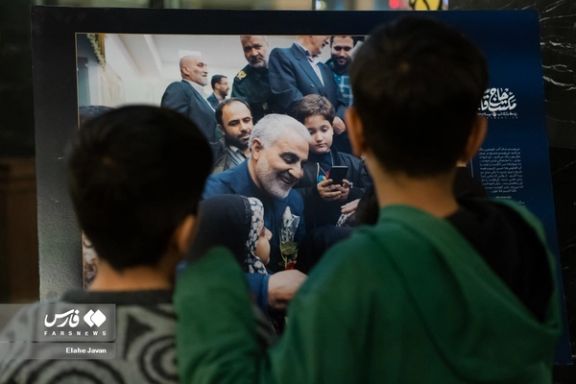
In the past few days, state-affiliated media in Iran have published many accounts of Soleimani’s “achievements” in the region and beyond, including a lesser-known story of his role in the Bosnian war in the early 1990s.
In an interview with the IRGC-affiliated Tasnim News, former commander of IRGC forces in Syria Mohammad Jafar Asadi described how Soleimani got involved in a European civil war almost immediately after taking charge of the Quds Force.
“It was almost 1am. I was home. The phone rang. I picked up and it was Qasem [Soleimani]... He said I need these weapons. Write them down. I said, now? He said, "No questions, start writing.”
The weapons were delivered early in the morning and shipped to the Balkans, where Iran was supporting Muslim Bosnians.
Asadi then went on to talk about Soleimani’s role in Syria, claiming that he was the one to convince Vladimir Putin to commit the Russian air force in support of the Syrian dictator Bashar Assad.
Russia and Iran did indeed become ‘strategic’ allies in Syria, propping up the Assad regime in a brutal campaign that killed at least 300,000 and brought total destruction to large parts of the country.
Not much of a surprise that some Syrians celebrated Soleimani's killing four years ago to the day.
Soleimani’s name once more became ubiquitous in Iran’s state-affiliated media after Hamas’ rampage of Israel on October 7, with many officials hailing the attack as an ultimate fruition of his efforts, while at the same time denying any direct involvement in the planning or execution of the operation.
In a long piece in the hardline paper Farhikhtegan, it’s claimed that Soleimani had a crucial hand in getting weapons into Gaza and even the West Bank –claims that are hard to verify or reject.
Moreover, Farhikhtegan revealed how Soleimani emphasized on domestic production of weapons in Gaza and Yemen –where Houthis have become a major headache, disrupting the flow of vessels in the Red Sea to and from the Suez Canal.
“He believed we should not limit our weapons support program to exports and teach them fishing so that they can make their own weapons… A considerable part of the Resistance’s weapons are manufactured in underground factories of Gaza. And it’s the same thing in Yemen.”
The targeted killing of Hamas leader Al-Arouri in Beirut could be the trigger many observers feared would draw in Hezbollah into a wider war with Israel. If that were to happen, if the Middle East were to be engulfed in a major war, Soleimani’s image would almost certainly be invoked again by all those involved, the outcome of that war notwithstanding.
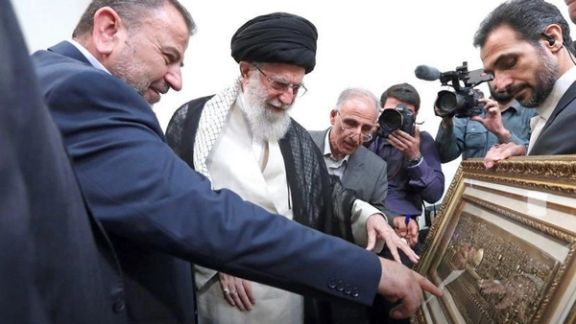
An air strike in Beirut on Tuesday killed Saleh Arouri, a top Hamas official and three others, officials with Hamas and the Lebanese group Hezbollah said.
Lebanon’s state-run National News Agency said the blast killed four people and was carried out by an Israeli drone. Israeli officials declined to comment.
Arouri is said to have had close ties to the Iranian regime and met Supreme Leader Ali Khamenei and other top officials on several occasions.
If Israel is behind the attack, it could mark a major escalation in the Middle East conflict. Hezbollah leader Sayyed Hassan Nasrallah had earlier vowed to retaliate against any Israeli targeting of Palestinian officials in Lebanon.
Hamas official Bassem Naim confirmed to The Associated Press that Arouri was killed in the blast. A Hezbollah official speaking on condition of anonymity in line with regulations also said Arouri was killed.
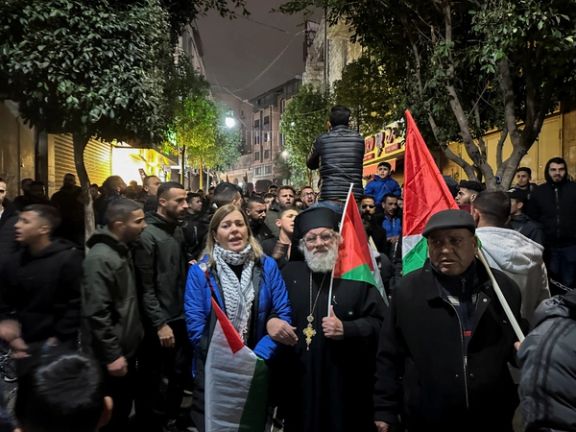
Arouri, one of the founders of Hamas' military wing, had headed the group's presence in the West Bank. Israel's Prime Minister Benjamin Netanyahu had threatened to kill him even before the Hamas-Israel war began on October 7.
The explosion shook Musharafieh, one of the Lebanese capital's southern suburbs, which are a stronghold of the militant Hezbollah group, an ally of Hamas. The explosion caused fire in Hadi Nasrallah street south of Beirut.
The explosion came during more than two months of heavy exchanges of fire between Israeli troops and members of Hezbollah along Lebanon’s southern border.
Since the hostilities between Israel and the Lebanese Hezbollah began on October 8, the fighting has been concentrated a few kilometers from the border but on several occasions Israel’s air force hit Hezbollah targets deeper in Lebanon.
Earlier in the day, Hezbollah said its fighters carried out several attacks along the Lebanon-Israel border targeting Israeli military posts.
(With reporting by The Associated Press)
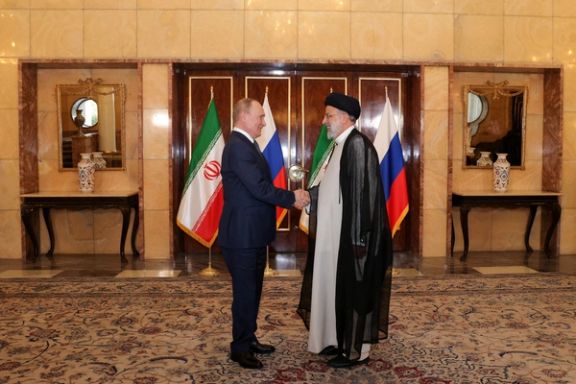
The conservative Iranian daily Jomhouri-e Eslami has issued a warning to government officials cautioning against an over-reliance on Moscow.
The newspaper criticizes Russia's recent alignment with the United Arab Emirates in denying Iran's territorial integrity over the disputed Persian Gulf islands, Greater Tunb, Lesser Tunb, and Abu Musa.
The hardline daily said that "despite claims of friendship" Russia's support for the UAE is "characterized as unanticipated betrayals, prioritizing their interests over diplomatic alliances".
Last month, the sixth Russian-Arab Cooperation Forum in Morocco concluded with a statement reiterating the UAE’s claim over the islands. Moscow had previously voiced its support for UAE’s claim back in July during a joint summit between the Persian Gulf Cooperation Council (GCC) and the Russian Federation.
The piece warns Iranian officials against over-reliance on Moscow, cautioning that Iranian officials might have placed too much trust in Russia.
Russia's relationship with the UAE has flourished in the wake of the war on Ukraine with Russian oligarchs flocking to the small Arab state free of sanctions. However, since the war, Tehran has become ever closer to Moscow, supplying drones used in the war on Ukraine as the two sanctioned nations warm, putting Moscow at the center of the historic conflict.
Historical and geographical records substantiate the longstanding connection of the three Persian Gulf islands to Iran. Despite this, the United Arab Emirates persistently claims ownership, characterizing the situation as an "occupation by the Islamic Republic of Iran."
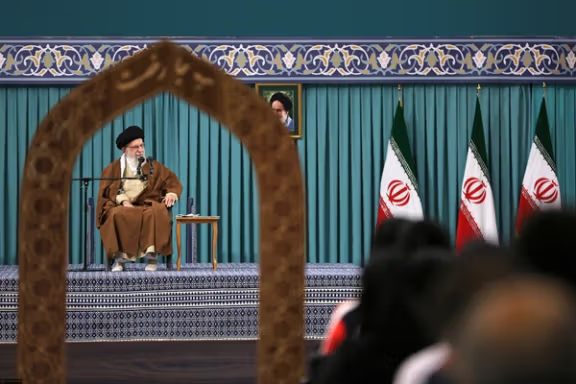
Iran’s 84-year-old ruler Ali Khamenei’s recent claim that God once spoke through him has led to sharp criticism and ridicule in the Iranian social media space.
On December 31, Khamenei was meeting with the family of former IRGC operative Qasem Soleimani, when he suddenly claimed that more than 20 years ago, he was in the company of a group of Revolutionary Guard officers when he started conveying an inspirational message to them.
"The Almighty God was speaking! In fact, it was my tongue, but it was God's words; it was a very extraordinary session,” Khamenei claimed, and added, “It had a significant impact.”
In Islamic theology, Khamenei's assertion that God spoke through him can be considered blasphemous. According to religious teachings, God communicated exclusively with Prophet Mohammed, as emphasized by some Iranian critics in the past two days. In Shiite oral traditions, there is no mention of any occasion where God spoke to Imam Ali, the revered figure in the faith, or to any other saint.
A well-known Iranian literary critic in exile and political commentator, Faraj Sarkouhi wrote on X, "Megalomania, self-centeredness, self-deification, claiming to be a prophet or the voice of God, a sense of exceptional wisdom, and extreme narcissism are considered characteristics of despots at the end of their reigns. Despots gradually fall into the trap of power, oblivious to the fragility of authoritarian power."
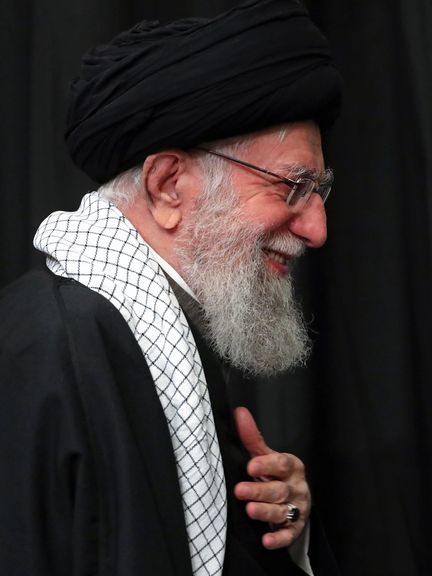
Some social media users also considered Khamenei's statements blasphemous and in contradiction with Islamic teachings. An Iranian social media user commented that “According to the Islamic Penal Code, which is used to suppress anti-government dissent, Khamenei's statements are punishable.”
Another individual wrote on X that "If an ordinary person had uttered the same statement, they would have been executed on charges of blasphemy, insulting sanctities, insulting the Supreme Leader, blasphemy against the Imams, and more."
Iranian experts generally agree that after being selected as Supreme Leader in 1989, Khamenei kept a much lower profile for many years, appearing relatively rational and reasonable in domestic politics. However, as years progressed and he replaced top military and intelligence personnel, he became more authoritarian and even senior ayatollahs began showing reverence to him. He subdued influential figures of the revolutionary years and made Shiite seminaries subservient to him. Another social media user questioned the silence of senior ayatollahs in the face of Khamenei’s unprecedented statement.
With his growing authoritarianism and his regime’s readiness to kill thousands of protesters in the streets and in prisons, Khamenei’s legitimacy has seriously suffered since 2009.
During protests since 2019, he has been the target of angry chants and derogatory insults. People routinely call him a dictator and blame him for the ever-worsening economy and living conditions.
So far, the reaction of officials to the scandal has been limited. Tasnim news website, affiliated with the Revolutionary Guard, published a rebuttal on Tuesday. An official from Imam Khomeini’s foundation wrote in Tasnim that attacks against Khamenei are orchestrated by foreign-based Persian-language media networks. This refers to Iran International, BBC and Voice of America Persian services, Manoto TV based in London and others.
At the same time, Mehdi Fazaeli, a member of the office for the preservation and dissemination of Khamenei's works and one of his close associates, on January 1st, dismissed reports about the illness of the Supreme Leader, labeling it as "psychological operations by the enemies."

The Taliban's foreign minister, Amir Khan Muttaqi, advocated for enhanced economic collaboration during his visit to Iran.
Muttaqi engaged in discussions with economic activists from both Iran and Afghanistan on Tuesday, encouraging Iranian traders “to seize the opportunities present in the Afghan market.”
Muttaqi emphasized Afghanistan's agricultural potential, fertile soil, clean water, and valuable mines, highlighting the mutual benefits of investments from neighboring countries like Iran.
Claiming that the Islamic Emirate swiftly improved security, Muttaqi cited a local trader's observation that before the Taliban, 20% of benefits were spent on security, which has significantly reduced under the new administration.
Expressing determination to transform Afghanistan into a regional transit hub, Muttaqi underscored the country's evolving role in transit and its growing economic centrality.
He also claimed that the government has an impartial stance on religious matters, asserting respect for all individuals, irrespective of Sunni or Shiite affiliations.
However, tensions persist between Iran and the Taliban, particularly regarding water issues. An Iranian parliamentary delegation visited Kabul in August to address concerns about the Taliban obstructing the Helmand River flow, impacting Iran's Sistan and Baluchestan region. The Taliban denies the allegations, intensifying the water crisis dispute.
Recently, critics of the Iranian government have cautioned against its open borders policy, expressing concerns about a potential hidden agenda. In response, hardliners accuse critics of fueling "Afghanophobia" amidst rising anti-Afghan sentiments on social media and instances of violence against immigrants.
Some critics speculate that authorities might be encouraging illegal Afghan immigration to address population decline or even to bolster the military by recruiting young Shiite Hazara Afghans. The situation reflects the complexities and challenges arising from the evolving relationship between Iran and Afghanistan.